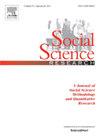刑事受害何时会破坏普遍信任?对犯罪类型、频率和种类影响的加权面板分析
IF 3.2
2区 社会学
Q1 SOCIOLOGY
引用次数: 0
摘要
来自不同领域的学者认为,刑事受害可能会打破普遍信任。纵向研究中的小平均效应只能为这一观点提供微弱的支持,而受害效应对于特定犯罪类型和多次受害可能更强。为了验证这一假设,我们利用 2014/2015 年(第一组;N = 3401)和 2020/2021 年(第二组;N = 2932)在德国两个城市进行的两波面板调查数据,结合能量加权和滞后因变量模型,估计了各种受害效应。我们发现,有微弱证据表明,受害对信任的破坏作用在严重犯罪类型或多重受害中更为明显。只有在 2014/2015 年,暴力犯罪和某些形式的多重受害的影响更强,而在 2020/2021 年则没有。此外,我们的加权程序意味着,我们(可能还有其他人)对更严重受害情况的研究结果必须谨慎看待,因为它们的内部有效性较低。本文章由计算机程序翻译,如有差异,请以英文原文为准。
When does criminal victimization undermine generalized trust? A weighted panel analysis of the effects of crime type, frequency, and variety
Scholars from various fields have suggested that criminal victimization can shatter generalized trust. Whereas small average effects in longitudinal studies provide only weak support for this claim, victimization effects may be stronger for specific crime types and multiple victimization. To test this assumption, we estimated various victimization effects by combining Energy weighting with lagged dependent variable models, using data from two-wave panel surveys conducted in 2014/2015 (cohort 1; N = 3401) and 2020/2021 (cohort 2; N = 2932) in two German cities. We found weak evidence that trust-undermining effects of victimization were more pronounced for severe crime types or multiple victimization. Effects were only stronger for violent crimes and some forms of multiple victimization in 2014/2015 but not in 2020/2021. Besides, our weighting procedure implies that our (and probably others’) findings for more intense victimization conditions must be viewed with caution, as they suffer from lower internal validity.
求助全文
通过发布文献求助,成功后即可免费获取论文全文。
去求助
来源期刊

Social Science Research
SOCIOLOGY-
CiteScore
4.30
自引率
4.00%
发文量
0
审稿时长
65 days
期刊介绍:
Social Science Research publishes papers devoted to quantitative social science research and methodology. The journal features articles that illustrate the use of quantitative methods in the empirical solution of substantive problems, and emphasizes those concerned with issues or methods that cut across traditional disciplinary lines. Special attention is given to methods that have been used by only one particular social science discipline, but that may have application to a broader range of areas.
 求助内容:
求助内容: 应助结果提醒方式:
应助结果提醒方式:


